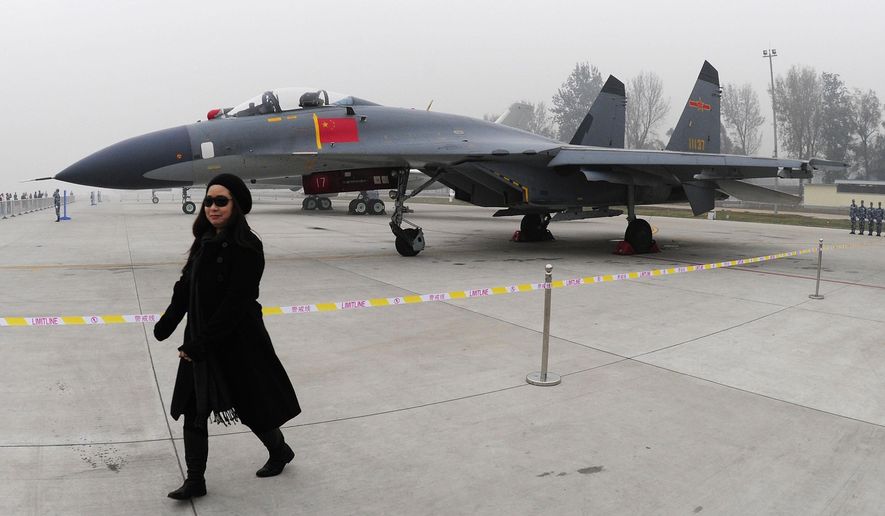A group of 15 Chinese warplanes intruded into Taiwan’s air defense zone on Saturday prompting the new Biden administration State Department to voice its concern for military pressure by Beijing on the island state.
Taiwan’s defense ministry announced eight Chinese bombers and four fighters jets were detected entering the southwestern corner of the air defense identification zone on Saturday. Two anti-submarine warfare planes and a reconnaissance aircraft also were spotted. The aircraft flew in international airspace but inside the air defense identification zone, prompting Taiwan to deploy air defense missiles in response.
China has been conducting regular air sorties around Taiwan in recent months but had stayed outside the air defense zone.
The large number of Chinese aircraft incursions appeared to be an early test for the new Biden administration and its commitment to supporting the island democracy that Beijing considers part of its territory.
“The United States notes with concern the pattern of ongoing PRC attempts to intimidate its neighbors, including Taiwan,” State Department spokesman Ned Price said in a statement. “We will stand with friends and allies to advance our shared prosperity, security, and values in the Indo-Pacific region — and that includes deepening our ties with democratic Taiwan.”
The mass aerial incursion included two Su-30 fighter-bombers, six J-10 and four J-16 fighters, two Y-8Q anti-submarine warfare aircraft and one Y-8G, a reconnaissance aircraft.
Taiwan’s defense ministry said jet interceptors were ordered to track the flights and radio warnings were issued along with the deployment of air defense missile systems to monitor the activity.
U.S. intelligence agencies have been closely monitoring China’s military for any signs of threatening activities toward Taiwan, according to a U.S. official. No activities by Chinese ground or naval forces have been detected in recent days.
During the Trump administration, more than $12 billion in new arms were offered for sale, including 66 F-16 jets and missiles capable of reaching the Chinese mainland.
A map made public by the Taiwan defense ministry showed that the jets entered the defense zone off the southeastern coast.
Lo Chih-Cheng, a senior lawmaker with the ruling Taiwanese Democratic Progressive Party, told Reuters the activities were an indication Beijing is seeking to deter the new administration from supporting Taiwan. “It’s sending a message to the Biden administration,” he said.
In a related development, new Defense Secretary Lloyd J. Austin III told his Japanese counterpart, Defense Minister Nobuo Kishi that the United States would defend Japan’s claim to the disputed Senkaku Islands under the U.S.-Japan Defense Treaty.
“Secretary Austin further affirmed that the Senkaku islands are covered by Article V of the U.S.-Japan Security Treaty and that the United States remains opposed to any unilateral attempts to change the status quo in the East China Sea,” Pentagon press secretary John Kirby said in a statement.
Japan has claimed the uninhabited Senkakus as its territory and calls them the Diaoyutai.
The U.S. Indo-Pacific Command announced Saturday that the aircraft carrier strike group led by the USS Roosevelt had entered the South China Sea, where China has claimed disputed islands. The carrier is conducting routine operations.
China expert Gordon Chang said the Roosevelt was sending a message to Beijing as it passed through the Taiwan Strait on the way to the South China Sea
“Essentially what the Biden team is saying to China [is] that they had better leave Taiwan alone, especially with our carrier strike group,” he said on Fox News Channel.
Mr. Chang said he believes China will step up provocative actions. “We know that China tests American administrations early on,” he said, noting the 2001 incident involving the mid-air collision between a Chinese jet and a Navy surveillance aircraft.
“This will escalate,” Mr. Chang said. “We’ve got a lot of Obama [administration] officials in the Biden administration. I hope they have learned something from the pretty weak policies during the Obama years, which ended up with disadvantageous results for the United States and indeed for our neighbors and partners in the Pacific.”
• Bill Gertz can be reached at bgertz@washingtontimes.com.




Please read our comment policy before commenting.